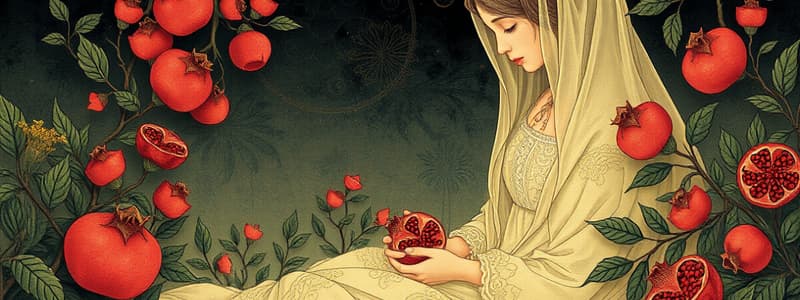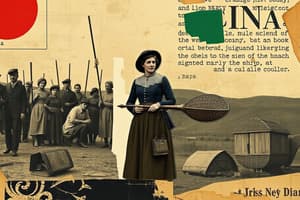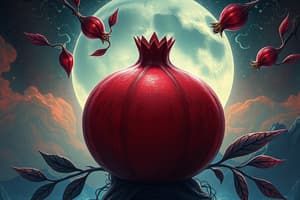Podcast
Questions and Answers
What does the phrase ‘rocks full of unshed tears’ symbolise in the context of the passage?
What does the phrase ‘rocks full of unshed tears’ symbolise in the context of the passage?
- The bitterness of regrets
- The joys of childhood memories
- The beauty of family connections
- The emotional pain of growing up (correct)
What is the effect of describing the road as 'flint-coloured'?
What is the effect of describing the road as 'flint-coloured'?
- It conveys a sense of warmth
- It creates a foreboding mood (correct)
- It suggests a bright future
- It indicates a joyful journey
What does Boland suggest about parental love in her reflections on freedom?
What does Boland suggest about parental love in her reflections on freedom?
- It is primarily about protection
- It often leads to regret
- It is unconditional and eternal
- It requires letting go for a child's growth (correct)
How does the use of anaphora in 'she will' contribute to the narrative?
How does the use of anaphora in 'she will' contribute to the narrative?
What is the significance of the juxtaposition between the open and closed mouth in the passage?
What is the significance of the juxtaposition between the open and closed mouth in the passage?
Flashcards
Motherhood in "The Pomegranate"
Motherhood in "The Pomegranate"
The poem explores the deep emotional connection and protective instincts inherent in a mother's love, using the myth of Ceres and Persephone as a lens.
Mythological References
Mythological References
The poem uses the myths of Ceres and Persephone to illustrate universal themes like maternal instincts and fears, connecting personal experiences with mythology.
Independence vs. Threat
Independence vs. Threat
The poem examines the tension between nurturing a child's independence and the accompanying anxieties involved.
Pomegranate Symbolism
Pomegranate Symbolism
Signup and view all the flashcards
Winter as Symbol
Winter as Symbol
Signup and view all the flashcards
"Rifts in time" Metaphor
"Rifts in time" Metaphor
Signup and view all the flashcards
Learning from the Past
Learning from the Past
Signup and view all the flashcards
Modern Imagery
Modern Imagery
Signup and view all the flashcards
Personal Perspective in "The Pomegranate"
Personal Perspective in "The Pomegranate"
Signup and view all the flashcards
Generational Cycles
Generational Cycles
Signup and view all the flashcards
Study Notes
Overview of "The Pomegranate"
- Explores the complex relationship between mother and daughter, using mythology as a lens.
- Draws on the myth of Ceres (Roman) and Persephone (Greek) to illustrate maternal instincts and fears.
- The duality of wanting to protect versus allowing independence is a central theme.
Key Themes and Ideas
- Motherhood: The deep emotional connection and protective instincts inherent in a mother’s love.
- Learning from the Past: Reflects on the inevitability of growing up and the lessons learned through mythology.
- Comfort in Myths: Myths serve as comforting narratives that help make sense of personal experiences and fears.
- Independence vs. Threat: The struggle between nurturing a child's independence and the threat that comes with it.
Stylistic Elements
- Imagery: Vivid descriptions create an evocative atmosphere that enhances emotional impact.
- Mythological References: Interweaving personal experiences with myth to highlight universal themes.
- Alliteration and Anaphora: Use of sound devices and repetition to create a lyrical quality in the narrative.
- First-person Narrative: Personal perspective engages readers and adds intimacy.
- Rhetorical Questions and Caesura: Engages readers and emphasizes the tension and reflection in the poem.
Poetic Analysis
- Opening line creates a personal tone, inviting readers to connect with the narrative.
- Boland’s childhood experiences in London depicted as an ‘underworld’, emphasizing feelings of dislocation and alienation.
- Contrasts between childhood innocence and the responsibilities of motherhood are evident in the shift from being an exiled child to a devoted mother.
- The metaphor of 'winter' symbolizes loss, aging, and the harsh realities of growing up, reflecting Boland's internal struggles as a mother.
- Contemporary images (teen magazine, can of Coke) ground the myth in modern reality and resonate with readers.
Symbolism and Metaphors
- Pomegranate: Represents desire, choice, and the irreversible act of maturing. Eating its seeds signifies the transition from childhood to adulthood and acknowledges the sacrifices involved.
- Stars and Winter: Symbolize hope, guidance, and the darker realities of life, contrasting innocence with the inevitability of change and heartache.
- ‘Rifts in time’: Represents the bittersweet nature of parenthood, wherein love also entails letting go.
Conclusion
- Boland ultimately embraces the necessity for her daughter to inherit her own experiences and engage with the world.
- The poem reflects on generational cycles of growing up, learning, and the complexities of maternal love.
- It highlights the duality of pain and beauty in relationships, further enriched by its mythological context.
Studying That Suits You
Use AI to generate personalized quizzes and flashcards to suit your learning preferences.




